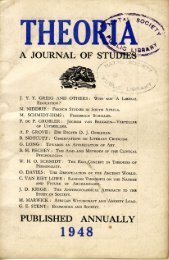Inqaba ya basebenzi Number 2 April 1981 - DISA
Inqaba ya basebenzi Number 2 April 1981 - DISA
Inqaba ya basebenzi Number 2 April 1981 - DISA
You also want an ePaper? Increase the reach of your titles
YUMPU automatically turns print PDFs into web optimized ePapers that Google loves.
8-hour day. There was a peaceful<br />
march and rally. Bui on Monday 3<br />
May Ihe police attacked, killing six<br />
pickets. The next day a peaceful<br />
protest meeting was held. Then a<br />
bomb was thrown at the police,<br />
probably by a police or bosses'<br />
provocateur. The authorities now<br />
had the excuse they wanted to attack<br />
the unions.<br />
Eight workers' leaders in Chicago<br />
were charged with murder. Seven<br />
were sentenced to death and one to<br />
15 years. A mass protest movement<br />
developed, including France. Italy.<br />
Russia. Holland and England.<br />
Under this pressure two of the<br />
sentences were commuted to life.<br />
One had already died in prison.<br />
Everywhere the capitalist class<br />
tries to weaken the movement of the<br />
workers by dividing them. May Day<br />
is the day of international workingclass<br />
solidarity, and the capitalists<br />
fear this. In many countries, again<br />
and again, they have tried to ban<br />
May Day demonstrations and rallies.<br />
Reformist labour leaders have<br />
tried to reduce May Day to a mere<br />
holiday. But the workers have<br />
marched, and will continue to do so.<br />
The spirit and traditions of the world<br />
proletariat cannot easily be destroyed.<br />
Always, even after long periods<br />
of lull, the workers are forced into<br />
massive struggles again.<br />
May Day <strong>1981</strong> will show that the<br />
labour movement is preparing itself<br />
• INTERNATIONAL<br />
On 11 November 1887 the four<br />
workers* leaders were hanged. One<br />
of them. August Spies, spoke the<br />
following words before he died:<br />
"There will come a time when our<br />
silence will be more powerful than<br />
the voices you have strangled today."<br />
Following the heroic struggles of<br />
the American working class in 1886,<br />
1 May became the traditional day of<br />
the international proletariat. On 14<br />
July 1889. the 100th anniversary of<br />
the French Revolution, the Socialist<br />
International declared 1- May as<br />
'Labour Day'.<br />
The first celebration of May Day<br />
took place on 1 May 1890. The three<br />
main demands were:<br />
• for the 8-hour day;<br />
• for international solidarity of<br />
the workers;<br />
• against militarism.<br />
Today these demands are still as<br />
relevant as ever. The rotten system of<br />
capitalism is creating mass unemployment.<br />
At the same time those<br />
with jobs have to work long, hard<br />
hours and overtime is no exception.<br />
In many countries the 8-hour'day has<br />
never been conceded.<br />
In the richest as well as the poor<br />
capitalist countries, less and less<br />
money is available for housing,<br />
schools and hospitals, but enormous<br />
sums are wasted on armaments. In<br />
war after war young workers are<br />
forced to fight and kill each other in<br />
the interests of their 'own' ruling<br />
class and to suppress national<br />
liberation struggles.<br />
for the struggles that lie ahead. On<br />
this day workers in many countries<br />
will rally, demonstrate and discuss<br />
the tasks they face.<br />
The history of the South African<br />
workers' movement has its own<br />
examples of workers* solidarity. On<br />
May Day 1931. for example, black<br />
and white unemployed in Johannesburg<br />
marched in a demonstration to<br />
the Carlton Hotel and the Rand Club<br />
where they demanded food. This<br />
event showed the potential for<br />
workers' unity across the colour bar,<br />
despite the vicious racial divisions<br />
sown by the capitalist class.<br />
19<br />
African People's Organisation and<br />
the Communist Party called on<br />
people of all races to stay away from<br />
work on 1 May and to demonstrate<br />
for freedom, land and the repeal of<br />
the colour bars. On 26 <strong>April</strong> the<br />
Minister of Justice said strong<br />
measures would be taken to counter<br />
these demonstrations. All meetings<br />
on 1 May were banned.<br />
On 1 May the police broke up<br />
gatherings on the Rand, attacked<br />
groups of workers who defended<br />
themselves, and fired, killing 18<br />
Africans and wounding over 30.<br />
The committee that had organised<br />
May Day gatherings declared 26<br />
June a day of national protest and<br />
mourning. It called for a general<br />
strike to commemorate the 18 who<br />
had lost their lives and to demonstrate<br />
against the passing of the<br />
Suppression of Communism Act.<br />
The call for a general strike met<br />
with wide response on 26 June. This<br />
day became known as Freedom Day<br />
and has remained a focal poi.Tt for<br />
resistance.<br />
26 June will always be an<br />
important day in the liberation<br />
struggle. But 1 May, which has long<br />
been neglected in South Africa,<br />
remains the workers' day.<br />
In South Africa on May Day <strong>1981</strong>,<br />
even If no demonstrations or rallies<br />
are called, the workers can begin to<br />
discuss the origins, demands and<br />
Importance of May Day, and lay the<br />
ground for future action. By doing so<br />
WORKERS' DAY<br />
1950 was a year of major struggles<br />
by the oppressed. The Transvaal<br />
ANC, the Indian Congress, the<br />
May Day Rally, Sweden. 1980.<br />
they will join the Immense batalllons<br />
of the world working class massing<br />
together In action on that day.
















